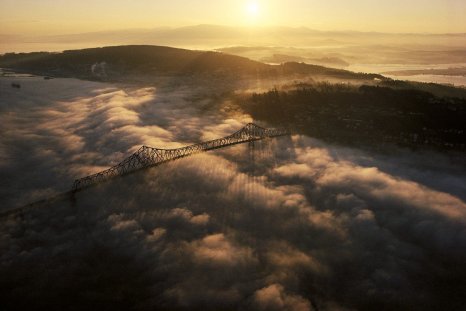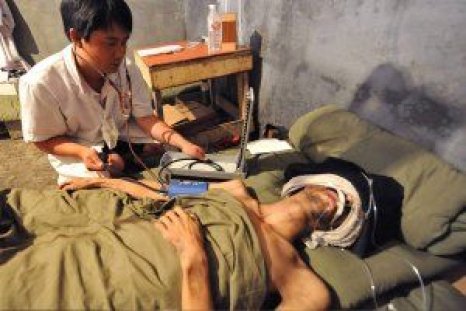Lakes Disappearing After Glacial Outburst Floods
Two and a half years ago, the Baker River in Chilean Patagonia suddenly tripled in size, causing a virtual river tsunami. In less than 48 hours, roads, bridges, and farms were severely damaged and dozens of livestock drowned.
Which Country Will See The Next Mining Disaster?
After the last Chilean miner was rescued from the San José mine, rescue worker Manuel Gonzalez ascended from the 700-meter-deep drill hole, and President Sebastián Piñera asked what he was thinking on the way up. Gonzalez replied: "That hopefully things in Chilean mining will now be different."
Sebastian Piñera on Earthquakes and the Economy
Thirteen days before Sebastián Piñera began his four-year term as Chilean president in March, the country suffered one of the most powerful earthquakes in recorded history. The first conservative elected president of Chile since 1958, this Harvard economist and self-made billionaire made earthquake recovery his top priority while taking an increasing role in Latin American affairs.
Want a Rich, Happy Country? Start Young.
President Bachelet leads the way in pushing the advantages of preschool.
Why Latin America is Still Building Dams
Dams are rejected in America as too destructive. Yet they are still promoted in Latin America. Why?
Periscope: Japan Seeks to Overturn Whaling Ban
As delegates from 81 countries converged on Chile for the International Whaling Commission's annual meeting, the host government left little doubt about where it stood on Japan's efforts to overturn the IWC's commercial-whaling moratorium.
Paul Watson Vows to Continue Anti-Whaling Crusade
Activist Paul Watson goes to extremes to prevent whale hunters from catching their prey. What drives him, and what he plans next.
Japan Isolated as Whaling Commission Meets in Chile
Japan again defends its hunts of the large sea mammals at an international meeting in Chile.
Counterinsurgency: The Great Goat War
On Isabela Island, the feral goat used to be public enemy No. 1. No creature has done more to sully the pristine ecology of the biggest island of the Galápagos.
Models: A Big Step to the Left
It's hardly surprising that Chilean President Michelle Bachelet didn't take them seriously at first. They were just a bunch of chiquillos --kids--decked out in their black-and-white high-school uniforms complaining about the quality of education.
Did We Kick Them Out?
When Bolivian President Evo Morales nationalized the gas industry last May 1, it was seen as the latest move toward greater state intervention in the energy sector by countries stretching from Venezuela to Russia.
Just Say Coca
Bolivian president Evo Morales recently implored the United Nations to give the coca leaf a new life. A former coca farmer himself, Morales asked the General Assembly to focus on coca's possible future as the raw material for a lucrative consumer-goods industry--not its nefarious present, as the source of the international cocaine trade. "This is the coca leaf, it is green, and not white like cocaine," Morales lectured, waving one limp little leaf at the hall of surprised dignitaries.
The Real Thing: Coca
Bolivian president Evo Morales implored the United Nations last week to give the coca leaf a new life. A former coca farmer himself, Morales asked the General Assembly to focus on coca's possible future as the raw material for a lucrative consumer-goods industry--not its nefarious present, as the source of the international cocaine trade. "This is the coca leaf, it is green, and not white like cocaine," Morales lectured, waving one limp little leaf at the hall of surprised dignitaries.
The Post-Neoliberal Age
Alvaro Garcia Linera's official title is bolivian vicepresident, though that doesn't quite capture his position in the Latin American left. The 43-year-old mathematician and soci-ologist--and prolific author--is, most importantly, considered the key architect behind socialist President Evo Morales's controversial policies in Bolivia, and a growing influence throughout the region.
Pollution: Losing Some Luster
At first Mario Mautz didn't think much about the Pascua Lama gold mine, 60 kilometers from his fields in Huasco, an agricultural valley in northern Chile.
An Unlikely Pioneer
The events of Sept. 11, 1973, turned Michelle Bachelet's world upside down. On that morning the 21-year-old medical student watched Chilean Air Force fighter jets fire rockets into the presidential palace known as La Moneda, a chilling salvo in the bloody coup that took the life of President Salvador Allende and installed a military junta led by Army commander Augusto Pinochet.
Interview: 'Our Own Hands'
On Dec. 18, six months after Bolivian President Carlos Mesa was forced to resign by a wave of street protests spearheaded by indigenous peoples, South America's poorest country will again go to the polls.
A Native Speaker
On the ballot, he is listed as Sixto Jumpiri, one more candidate in the Bolivian national elections later this month. But to the Aymara and Quechua Indians of the Bolivian highlands, he is better known as Apu Mallku, or Supreme Leader.
'The Glass Has Broken'
Augusto Pinochet's twilight years have not been kind to him. The former Chilean dictator has long been scorned for alleged human-rights violations--political violence claimed the lives of some 3,200 people during his 17-year rule (from 1973 to 1990).
A Man For The People
Evo Morales is not a conventional politician. He's an Aymara Indian who grew up in the harsh southern highlands of Bolivia. The son of a llama shepherd, he didn't graduate from high school but instead worked as a trumpet player in a bar band when he was a teenager.
BEYOND 'DRUGS AND THUGS'
A newly appointed U.S. diplomat to an Andean country was asked recently how he viewed his assignment. His response: "Ah, you know, it's all about drugs and thugs." That, says a new report issued by the New York-based Council on Foreign Relations (CFR), America's leading foreign-policy think tank, is precisely the problem with U.S. policy in the Andean region.
Latin America, The Search For Good Jobs
For years Venancio Andrade eked out a meager living selling pots and pans on the dusty streets of Lima and neighboring towns. He eventually taught himself how to make aluminum kitchen supplies, and in 1985 he scraped together enough money to buy a parcel of land in a barren industrial park on the outskirts of the Peruvian capital.
A President Gets The Boot
Gonzalo Sanchez de Lozada was an inviting target. The wealthy owner of Bolivia's largest private mining company grew up in the United States and embraced globalization with unmitigated gusto.
'I Am Not A Criminal'
Augusto Pinochet appeared a harmless senior citizen when aides wheeled him out of Santiago's military hospital a few weeks ago. The white-haired former dictator grinned broadly before disappearing into an armored Mercedes.







